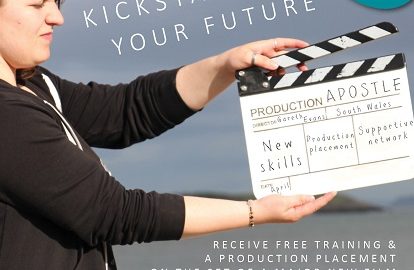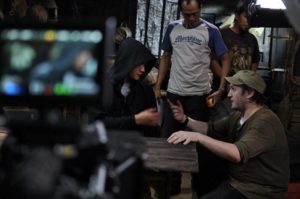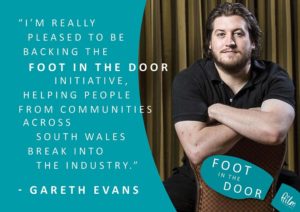What’s not to like about a scheme which tackles more than one problem at a time? Ffilm Cymru Wales has launched Foot in the Door / Troed yn y Drws focused on a large group of people in Wales who are currently hampered by exclusion from the workforce, while the workforce is hampered by losing out on their skills.
This pilot project broadens access to the Creative and Cultural Industries of Wales in the Film and TV sector. It is aimed at people who are, to use the language of funding applications, the ‘socially-economically deprived’. Yet these are people with trade skills in hairdressing, carpentry, construction, computing, transportation etc − skills which could be harnessed to increase the industry’s capacity; skills which could be put to work in this sector.
To achieve a diverse workforce for Wales in Film and TV means tackling various types of exclusion, including the under-representation of ethnic minorities, women, the disabled … but also of those who are currently off the radar because of financial and access obstacles.
Foot in the Door/Troed yn y Drws is trying out ways of making production careers possible for those who might work in the sector if they knew what was possible and had some basic assistance in taking the initial steps.
This project catches the imagination because it begins from where people are, emphasising their existing abilities and addressing the obstacles which are preventing them from taking advantage of opportunities – opportunities they first need to know about if they are ever to even consider taking them.
Foot in the Door/Troed yn y Drws has just closed its application round and is due to start in earnest this April.
Pauline Burt, Chief Executive of Ffilm Cymru Wales, outlines some of the barriers faced by people who could be working in the industry:
– Lack of understanding at community level (teachers, careers advisors, community officers) of the opportunities and transferable skills within film
– Lack of transport
– Inability to afford or access childcare
– Peer group expectations (with some communities experiencing three generations of unemployment)
– Lack of industry network
– Relatively low FE/HE take up
But how is a film agency placed to tackle the logistical problems, such as childcare? Ffilm Cymru Wales has, sensibly, sought to ally itself with existing expertise by partnering with a housing association. Charter Housing manages 5,000 homes in Newport, Torfaen, Caerphilly and Monmouthshire. This links the project to an agency solidly based in the communities, which knows the everyday realities and challenges locally but also the aspirations, ambitions and talents. Charter Housing has facilities and services which Ffilm Cymru Wales could not hope to provide without prohibitive expense.
Other partners in the project are Our COLAB; production company, Severn Screen and Creative Skillset. Severn Screen’s new period thriller, Apostle (director, Gareth Evans of martial arts hit The Raid) will provide the practical shoot experience.
The project intends to develop clusters of participants who will be able to support each other peer-to-peer and to foster access with industry through the project’s partnerships and mentors.
A crucial element, alongside instruction in production work is introducing people to the expectations of the industry and to its networks − What-you-know needs to meet up with Who-you-know − and to the nature of freelance production work, which can be unpredictable, short-term, demanding and reliant on good domestic support.
The project has 5 distinct phases:
(i) R&D, particularly on scaleable elements
(ii) Preparatory classroom-style sessions with industry professionals introducing the basics of film set experience; health and safety; personal finance; education, training and work pathways and signposting; transferable skills that allow for local job opportunities and sector fluidity.
(iii) Network development both within communities and industry networks.
(iv) Production taster: minimum 1-week work experience placement on a production, supported by a production Buddy and their mentor.
(v) Shared learning:
- participants’ experience – to a wider network of new and emerging talent accompanied by their mentors and invited guests
- data and findings around tested methods of reducing barriers of entry
- how to develop inclusive recruitment, aimed at producers
- on-line filmed and downloadable education resources to inspire and support others.
While applauding the imaginative and bold nature of this project, I have some questions. How will industry-standard training be applied in these circumstances, that is, how will the practices and standards of these entrants compare with workers who have come up through ‘traditional’, and usually extended, vocational training in the media sector?
Thought has been given to how these new entrants might be integrated into existing networks but although the co-operation of trade unions would seem to be essential, no trade union is a named partner at this stage. One assumes the work already being done by unions in this area should be drawn upon, such as literacy and numeracy training and the many other skills on offer through union learning routes.
The industry’s willingness to welcome these entrants will be key to the project’s long-term success so perhaps it would be wise to both bring tv further into the mix to increase the work opportunities and do major out-reach to win industry hearts and minds.
This is a project that deserves attention beyond the Film world. The fate of this first cohort will test the methodology. Full marks to the partners for launching out in a bold bid to broaden the base of the workforce in Wales. Let’s look forward to the proposed BFI NET.WORK event which will feed back on the pilot.



One thought on “Getting a Foot in the Door – Increasing Diversity in Film in Wales”
Comments are closed.